
Sign Up
Want to receive a newsletter to learn more about KuneKune pigs and other educational information? Sign up to have them delivered right to your inbox.
We look forwarded to sending you some great info.
Learn with IKKPS
How Many Piglets Does a KuneKune Have?
This is a commonly asked question: How many piglets does a KuneKune pig have? What are the KuneKune Litter size and how many piglets does a KuneKune pig have? Today in this article we are going to discuss all the factors that could influence your litter size.
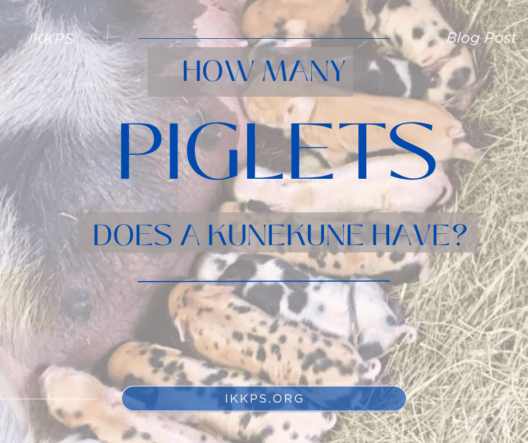
On this page, click to go directly to that section
Introduction
In the world of pig farming, there is one breed that stands out for its captivating journey and adorable appearance: the KuneKune pig. Originating from New Zealand, these small and friendly pigs have an intriguing history that dates back centuries. But one question that often comes up is, how many piglets do KuneKune pigs typically have?
In this article, we will delve into the fascinating world of KuneKune pigs and uncover the secrets of their reproduction. We'll explore their breeding habits, gestation period, and average litter size. Whether you're a pig farmer or simply fascinated by these lovable creatures, this article will provide you with the answers you seek.
But it's not just the numbers that make KuneKune pigs unique. Their friendly and docile nature sets them apart from other pig breeds, making them popular choices for both farmers and pet owners alike.
So, join us on this journey as we uncover the little-known aspects of KuneKune pig reproduction and learn more about these delightful creatures.
The breeding habits of KuneKune pigs
KuneKune pigs are known for their excellent reproductive capabilities and their great mothering instincts. They reach sexual maturity at around 12-14 months
of age, which is relatively slower compared to other pig breeds. Once mature, both male and female KuneKune pigs exhibit natural breeding behaviors. While farmers of other swine breeds often choose to use artificial insemination for controlled breeding, natural breeding is common among KuneKune pigs.
During the breeding season, which typically occurs year-round, male KuneKune pigs become more active in pursuing females. They display courtship behavior such as vocalization, mounting, and chasing. Female pigs, on the other hand, become receptive and show signs of estrus by standing still and allowing the male to mount them.
After successful mating, the female KuneKune pig undergoes a gestation period, which lasts for approximately 116 days. This period may vary slightly depending on individual pigs and environmental factors. It is not uncommon for them to go one day before or one day after.
Factors that influence the number of piglets
Several factors can influence the number of piglets a KuneKune sow will have in a litter. The age and overall health of the sow play a crucial role in determining litter size. Typically, younger sows tend to have a smaller litter, while older sows may have larger ones. However, it's important to note that there can be exceptions to this general rule.
Usually, a first-time mom will have a smaller litter ranging from 4-6 piglets and will usually have a normal litter size from there on of 5-9 piglets. Some KuneKune bloodlines are known to produce larger litter like the Momona, Wilsons Gina, and BH Rebecca Ginas. However, it is important to note that with breeding over generations, this has become more distorted in generations.
Nutrition also plays a significant role in determining litter size. A well-balanced diet and proper nutrition during pregnancy can contribute to healthier and larger litters. Pig farmers need to ensure that their KuneKune sows receive adequate nutrition throughout their pregnancy to maximize litter size and overall piglet health.
It is important to note that a well-balanced diet does not mean to overfeed your pregnant female. This can cause the piglets to get too big and cause delivery issues during farrowing. The golden rule is to increase the feed once the piglets have been born.
Additionally, genetic factors can influence litter size. Some KuneKune bloodlines are known for consistently producing larger litter, while others may have smaller litter sizes. Breeders often select sows and boars with desirable genetic traits to improve litter sizes in subsequent generations.
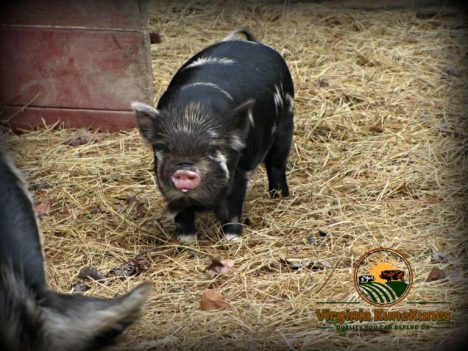
Read Herd Management to learn more about how your management style can affect the outcomes.
Average litter size of KuneKune pigs
On average, KuneKune pigs have a litter size ranging from 5 to 8 piglets. However, it's important to remember that this is just an average, and individual litter may vary. Some sows may have smaller litters of 3 to 4 piglets, while others may have larger litters of 9 or more.
Your first and last litter will remain on the smaller end of litter sizes. It is usually fairly easy to tell when your sow is about to finish with her breeding career as the litter size will be smaller. Let’s say that you typically get 8-9 piglets from your Wilsons Gina sow. As she ages at maybe 6 years of age, she produces 4 piglets. That could mean she is nearing the end of her breeding career. This is an excellent time to retain a female piglet to continue your Wilsons Gina line in your herd.
It's worth noting that the breed standard for KuneKune pigs does not specify an ideal litter size. Instead, the focus is on the overall health and well-being of the sow and piglets. Breeders aim to produce healthy and robust piglets rather than focusing solely on the number of piglets in a litter.
Rare cases of a large litter
While the average litter size for KuneKune pigs falls within the 5 to 8 range, there have been rare cases of sows giving birth to an exceptionally large litter. These outliers can sometimes surprise breeders and farmers with a litter of 11-14 or more piglets. However, it's important to note that very large litters can come with their own set of challenges.
When a sow has a large litter, there is a higher risk of piglet competition for teats and milk, which can result in weaker or smaller piglets not receiving adequate nourishment. Additionally, a larger litter can put a strain on the sow's body, making it harder for her to provide sufficient milk for all the piglets.
Proper management and monitoring are crucial when dealing with a large amount of litter to ensure the health and well-being of both the sow and her piglets.
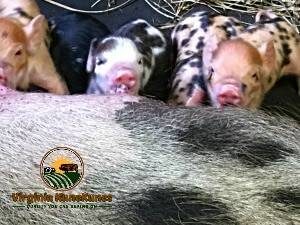
Common challenges in KuneKune pig breeding
Breeding KuneKune pigs comes with its own set of challenges, just like any other pig breed. Pig farmers need to be aware of these challenges and take appropriate measures to overcome them.
One common challenge is the failure of conception. Sometimes, despite successful mating, a sow may not become pregnant. This can occur due to various factors, such as improper timing of mating or underlying health issues. Regular veterinary check-ups, proper timing of mating, and thorough monitoring can help increase the chances of successful conception.
At times it is often as simple as removing the sow and boar for some time to “make the heart grow fonder”. Breeding pairs that have grown up together can often be a challenge for even the most experienced breeders.
Another challenge is the occurrence of stillborn piglets or piglet mortality shortly after birth. This can happen due to complications during the birthing process, inadequate care, or underlying health issues in the piglets. Proper management, good hygiene practices, and prompt veterinary attention can help minimize the risk of stillbirths and piglet mortality.
Tips for successful KuneKune pig breeding
To ensure successful breeding and healthy litters, here are some tips for pig farmers and breeders:
- Provide proper nutrition: A well-balanced diet is crucial for the health and reproductive capabilities of KuneKune sows. Consult with a veterinarian or nutritionist to develop a diet plan that meets the specific nutritional needs of your pigs.
- Monitor heat cycles: Keep track of your sow's heat cycles to determine the optimal time for breeding. This can be done by observing behavioral changes and physical signs of estrus.
- Practice responsible breeding: Select breeding pairs that complement each other in terms of genetic traits and overall health. Avoid breeding closely related pigs to minimize the risk of genetic disorders.
- Ensure proper housing and care: Provide a clean and comfortable environment for your pigs, ensuring they have access to fresh water, adequate space, and shelter. Regularly monitor their health and seek veterinary assistance when necessary.
- Maintain good record-keeping: Keep detailed records of breeding dates, litter sizes, and any health issues that arise. This information can help you identify patterns and make informed decisions for future breeding. Utilizing the KuneKune Registry herd books will also help keep good records.
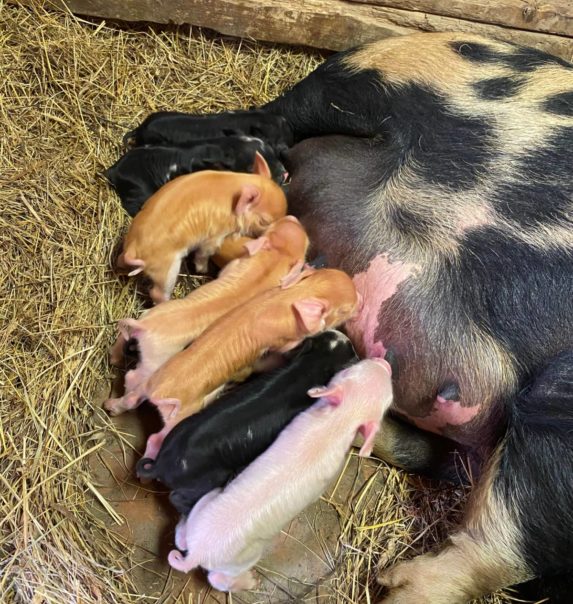
Importance of responsible breeding practices
Responsible breeding practices are crucial for the long-term health and well-being of KuneKune pigs. It is important for breeders to carefully select breeding pairs, taking into account genetic traits, conformation, health, and overall quality. By doing so, breeders can contribute to the preservation and improvement of the breed.
On the other hand, irresponsible breeding practices, such as excessive inbreeding or breeding without considering the health, conformation, and temperament of the pigs, can lead to a decline in the breed's overall quality and increase the risk of genetic disorders. Therefore, breeders and farmers need to prioritize responsible breeding practices to ensure the continued success and sustainability of the KuneKune pig breed.
Most KuneKune Registries will have information about breeding KuneKunes including COI calculators, trial breedings, Ancestor Loss Co-efficients, and other valuable resources to help you make good breeding decisions. IKKPS allows trial breedings and full access to COI calculators and AVKs not only for our members but, also for the non-members to be able to make good choices in their breeding plans. IKKPS is the only organization that does not limit these valuable tools to members only.
Caring for KuneKune piglets
Once the KuneKune piglets are born, it's crucial to provide them with proper care and attention. The first few weeks of a piglet's life are critical for their growth and development. The IKKPS offers a ton of information related to proper care, feeding, weaning, vaccinations, and deworming. Please make sure you take time to review all this information.
Ensure that the piglets have access to a warm and clean environment. Provide them with a secure area where they can nurse and rest without being disturbed. Regularly check their health, monitor their weight gain, and observe their behavior to detect any signs of illness or distress.
Feeding is another crucial aspect of piglet care. If the sow is unable to produce enough milk or if there are orphaned piglets, supplemental feeding may be required. Consult with a veterinarian to determine the appropriate milk replacer and feeding schedule for the piglets.
Lastly, socialization is essential for KuneKune piglets. These pigs are known for their friendly and docile nature, so it's important to handle them gently and expose them to human interaction from an early age. This will help them develop positive relationships with humans and make them more suitable as pets or farm animals.
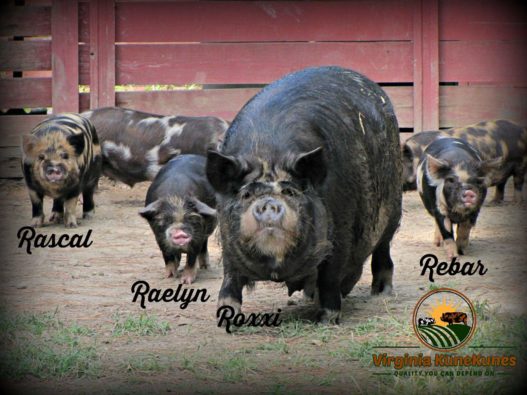
Conclusion: The joy of raising KuneKune piglets
As we've explored the fascinating journey of KuneKune pigs and their reproduction, it's evident that these delightful creatures have a lot to offer. From their friendly nature to their unique breeding habits, KuneKune pigs continue to captivate pig farmers and enthusiasts around the world.
Understanding the factors that influence litter size, the challenges of breeding, and the importance of responsible practices can contribute to successful pig farming and the overall well-being of the KuneKune breed. So, whether you're considering breeding KuneKune pigs or simply appreciating their adorable presence, the joy of raising KuneKune piglets is an experience like no other.
Embrace the journey and enjoy the rewards of these lovable pigs!
Registry Office
17500 Hamilton Arms Court Dewitt, VA 23840